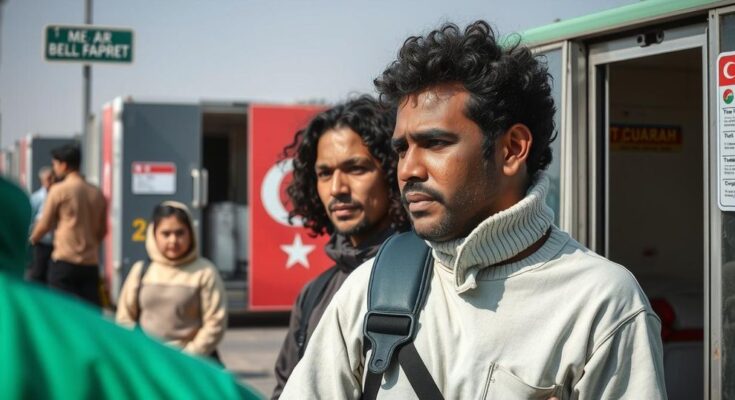The UN has reported that Turkey has forcibly deported nearly 300 Eritrean migrants, raising serious concerns about human rights violations. The deportees face torture and other atrocities upon return to Eritrea. Turkey is being urged to cease these actions, improve detention conditions, and assess asylum claims on an individual basis, as the situation poses significant risks under international law.
The recent report from the United Nations has highlighted Turkey’s coercive deportation of nearly 300 Eritrean migrants, which has raised serious concerns over human rights violations. The UN Special Rapporteurs expressed apprehension regarding the arbitrary detention and forced repatriation of these individuals, further warning of the imminent risk concerning an additional 50 Eritrean migrants. The organization underscored that such deportations are in direct violation of crucial human rights and refugee laws, specifically international conventions that prohibit the return of individuals to countries where they are at severe risk of harm.
The UN rapporteurs emphasized that individuals deported to Eritrea face a heightened risk of torture and inhumane treatment due to the oppressive conditions within the country, where many are subject to forced conscription and labor. The report further detailed that returnees from Turkey frequently encounter torture and enforced disappearances upon their return, thus significantly expanding the implications of Turkey’s actions on international human rights. The dire state of Eritrean deportees prompts a critical examination of Turkey’s foreign policy and treatment of refugees, as the country grapples with its responsibilities under international law.
Additionally, the conditions reported at Turkey’s Aydın Repatriation Center, where 50 Eritreans are currently detained, have drawn significant condemnation from UN officials. Allegations include physical abuse by guards, confinement in excessively hot metal container cells, inadequate medical treatment, and the denial of legal representation, all of which contribute to a highly concerning human rights situation. The UN experts have urged Turkey to cease these deportations, improve conditions for detainees, and conduct thorough assessments of asylum applications, asserting that the government’s response remains undisclosed as of now.
The deportation of Eritrean migrants by Turkey comes against a backdrop of growing concerns regarding human rights practices in both Turkey and Eritrea. Over recent years, Eritrea has been notorious for its repressive regime characterized by indefinite conscription, forced labor, and severe human rights violations. Turkey, while hosting a significant number of refugees, has faced increasing scrutiny for its treatment of those seeking asylum, especially amidst political tensions. The call from UN officials to adhere to international human rights standards illustrates the global demand for accountability in the light of refugee protection.
In summary, the United Nations’ report on Turkey’s deportation of Eritrean migrants underscores the urgent need for adherence to international human rights laws. It highlights the potential repercussions of these actions not only for the deportees, who risk returning to a perilous situation but also for Turkey’s international standing. By calling for immediate cessation of deportations, enhanced conditions for detainees, and evaluation of asylum claims, the UN aims to safeguard the rights of vulnerable individuals while urging Turkey to fulfill its obligations under international law.
Original Source: www.garoweonline.com




